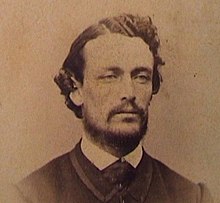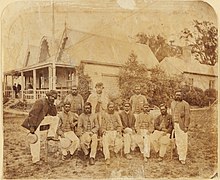Tom Wills
His final years were characterised by social alienation, flights from creditors, and heavy drinking, likely as a means of numbing post-traumatic stress disorder (PTSD) symptoms that resaulted from the massacre.[11] The following year, in light of Thomas Mitchell's account of "Australia Felix", the Willses overlanded south with shepherds and their families to the Grampians in the colony's Port Phillip District (now the state of Victoria).[14] Living in tents, the Wills family settled a large property named Lexington (near present-day Moyston) in an area used by Djab wurrung Aboriginal clans as a meeting place.Horatio blamed "distant predatory tribes" for provoking hostilities in the area, and the closest he came to admitting that he had killed Aboriginal people was in a letter to Governor Charles La Trobe: "... we shall be compelled in self defence to measures that may involve us in unpleasant consequences".[54] In June, Wills played cricket at Rugby School for the last time, representing the MCC alongside Lord Guernsey, the Earl of Winterton, and Charles du Cane, governor-to-be of Tasmania.[72] Although Wills enjoyed his lofty amateur status, he liked to socialise with and support working class professional cricketers—an egalitarian attitude that sometimes led to conflict with sporting officialdom but endeared him to the common man.[87] Wills' letter was alluded to two weeks after its publication in an advertisement posted by his friend, professional cricketer and publican Jerry Bryant, for a "scratch match" held adjacent to the MCG at the Richmond Paddock.The first of several kickabouts held that year involving Wills, Bryant and other Melbourne cricketers,[88] it was described by one participant as "football Babel"; a "short code of rules" were to be drawn up afterwards, however this does not seem to have occurred.[89] Another landmark game, played without fixed rules over three Saturdays and co-umpired by Wills and teacher Dr John Macadam, began on the same site on 7 August between forty Scotch College students and a like number from Melbourne Grammar.[96] Subsequently, they rejected common features such as "hacking" (shin-kicking) and produced a signed document listing ten simple rules suited to grown men and Australian conditions.[118] In January 1861, Tom, Horatio and a party of employees and their families travelled by ship to Brisbane, disembarked in Moreton Bay, and then, with livestock and supplies, set out on an eight-month trek through Queensland's rugged interior.[134] Tom never articulated his version of events in writing, but his brother Cedric wrote years later that it was an act of revenge for an attack made on local Aboriginal people by Jesse Gregson, a neighbouring squatter whom they mistook to be Horatio.[146] With the cricket season approaching, Wills agreed to captain Queensland against New South Wales, and then left the colony to lead a Victoria XXII at the MCG against George Parr's All-England Eleven.[150] The 1863–64 season saw Wills' engagement to Anderson collapse, possibly due to his womanising, and the trustees of Cullin-la-ringo accused him of mismanaging the property, in part by squandering family finances on alcohol while claiming it as station expenditure.At the end of a winter beset with public brawls over which team "owned" him, Wills moved to Geelong for the remainder of his career, prompting Bell's Life in Victoria to report that Melbourne had lost "the finest leader of men on the football field".[157] The following year, when the running bounce and other rules were formalised at a meeting of club delegates under Harrison's chairmanship, Wills was not present; his move to Geelong had cut him off from the rule-making process in Melbourne.[172] Others, such as this contributor to The Empire, addressed him as a hero:[173] Although you may not be fully aware of the fact, allow me to tell you that you have rendered a greater service to the aboriginal races of this country and to humanity, than any man who has hitherto attempted to uphold the title of the blacks to rank amongst men.Wills' role took on a symbolic significance: supporters and critics alike used his status as a 'native' (Australian-born colonist) to identify him with his 'native' (Indigenous) teammates, and he was also noted for speaking in "their own lingo".[182] Within days of his release in March, Gurnett embezzled some of the funds and left the team stranded in Sydney, dashing any hopes of a trip overseas and confirming Wills' suspicion that he was a con artist.[208] A series of superb club cricket performances in February 1872—including a single innings ten-wicket haul for 9 runs against St Kilda—removed any doubt that Wills would play for Victoria in the next intercolonial against New South Wales, scheduled for March on the MCG.[218] It was assumed that, on his homeward journey, Grace would play a final match in the South Australian capital of Adelaide, but he bypassed the city when Kadina, a remote mining town in the Copper Triangle, offered him more money.One year later, they made offers to play in Melbourne, but these were declined amid abuse from the city's press, with one journalist stating: "Public sentiment appears to be so far from approving it, that the eccentric example of the [Bendigo team] is not likely to be followed elsewhere.[34] Through his research, journalist Martin Flanagan concluded that Wills was "utterly bereft of insight into himself",[258] and football historian Gillian Hibbins described him as "an overbearing and undisciplined young man who tended to blame others for his troubles and was more interested in winning a game than in respecting sporting rules.Language was breathless and explosive and he revelled in presenting himself and his motives as mysterious.In one of his borderline "thought disordered" letters, it is evident that at times he entered a state of depersonalisation: "I do not know what I am standing on ... when anyone speaks to me I cannot for the life of me make out what they are talking about—everything seems so curious.[281] With furious bowling Wills assails His rivals, and knocks o’er their bails; His ball comes like a stone, From some huge catapulta hurled, In sieges of that earlier world You read of as a boy, ...[293] In July 1860—in what the press called a "coup de main", and what has since been regarded as a "tactical leap" that foreshadowed modern football—Wills breached the era's notional offside line by positioning his Richmond men down the field from defence to attack.[294] That same month, captaining Melbourne to victory, he pioneered a rudimentary form of flooding; and, in another win for the club, exploited the low player turnout by instructing his men to dart with the ball in open spaces.[301] Coinciding with a revival of interest in Australia's colonial past, Wills has risen "almost to a vogue", and is seen as a forerunner of today's self-destructive star athletes, some of those qualities that alienated his peers "being less shocking to a generation that likes its heroes flawed".[321] In Moyston, the self-proclaimed birthplace of Australian football,[317] stands an AFL-endorsed monument, unveiled by historian Col Hutchinson, commemorating Wills' childhood in the area playing Marngrook.[323] In her analysis of early football, Hibbins concludes that Thompson's journalistic ability as a promoter of the game "probably" makes him the most significant pioneer, and that the importance of Wills' role has been overemphasised.[333] In response to Collins' suggestion that Wills "quickly faded from the footballing scene", journalist James Coventry highlighted his seventeen-year playing career (by far the longest of the pioneers), the influence he wielded as captain-coach of various clubs for much of that time, and his administrative work.




















Thomas Wills (disambiguation)Molonglo PlainColony of New South WalesHeidelberg, Colony of VictoriaSuicide by stabbingHoratio WillsThomas AntillH. C. A. HarrisoncricketerAustralian rules footballpenal colonyNew South Walesconvictsthe bushstationssquatterVictoriaAboriginal peopleRugby Schoolcaptainrugby footballCambridge Universityannual cricket matchOxfordfirst-classMarylebone Cricket Clubbowlingall-rounderVictoria cricket teamintercolonial matchesMelbourne Cricket ClublarrikinoutbackQueenslandAustralia's largest massacrebouncerbending sporting rulesthrowingcalled in a top-class Australian matchwomen's cricketpost-traumatic stress disorderdelirium tremensAustralian culturereconciliationIndigenoushistory warsMarn GrookWilliam WentworthCanberraHoratioconvicthighwaymanBotany BayHillsboroughSydneyGeorge HoweThe Sydney GazetteParramattaSt Andrew'scurrencyemancipistnationalistAustralian republicEugene von GuérardMolonglo RiverThomas MitchellAustralia FelixGrampiansPort Phillip DistrictsquattingMount WilliamMount Araratthe ArkGospel of JohnMoystonDjab wurrungcorroboreesGeorge Augustus RobinsonChief Protector of AboriginesCharles La TrobeMelbourneMary ReibeycricketDaguerreotypeUniversity of CambridgeWilliam RedfernThomas Arnoldmuscular Christianityunderhandroundarm bowlingclean bowledbatsmancricket statisticsLord'sno-balledJohn LillywhiteAlfred MynnWilliam ClarkeAll-England ElevengamesmanshipkickerHare and HoundsLillywhite's GuideAboriginal weaponsGentlemen of KentG. Anderson's XIUmpiringBatting averageWicketsBowling average5 wickets in inningsstumpingsKent County Cricket ClubGentlemen sidesI Zingarimatriculateuniversity's cricket teamMagdalene CollegeUniversity MatchLord GuernseyEarl of WintertonCharles du CaneTasmaniaVictorian gold rushLegislative AssemblyVictorian Parliament